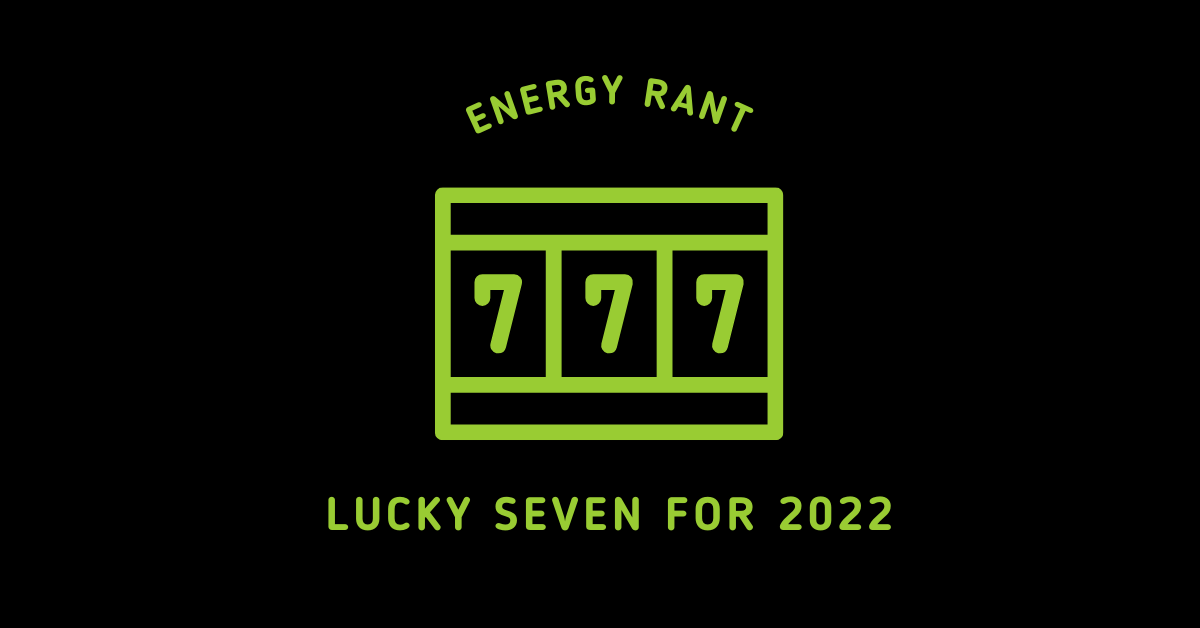
While compiling the last post in which I reviewed the accuracy of my predictions for 2021, I realized that most of those were in the 20-30 year timeframe. For 2022, I forced myself to choose most things that will or will not happen in 2022 – the good and the bad.
Coal Record
Annual worldwide coal consumption will pass the all-time high set in 2014. China is not playing the West’s games. They didn’t show up to the Glasgow party, send a video or a love letter. The Chinese Communist Party (CCP) is focused on world domination, economics, geopolitics, and defense, and they don’t care about CO2. They have about 5x the coal-fired generation that the United States has, and the ratio is expanding rapidly. They bring a major coal-fired power plant (1000 MW) online about every two weeks. Do you think they use scrubbers to remove sulfur, mercury, and other nasties? No. We export our pollution to the other side of the planet. Our cleaner electric grid better be affordable AND reliable compared to the CCP’s dirty grid, or it will drive more manufacturing, coal, and CO2 emissions over there.
Rare Earth
Last week I wrote that betting against technology has a losing record. In some cases, the price of technology falls until physical constraints are encountered, like a brick wall. Solar panels and electric vehicles are part of this group. People believe it’s high tech, so prices will fall forever, as with computers and phones. Not so, because of the volume of materials required. They are subject to commodity pricing like the housing and food processing industries. The CCP, which controls most of the rare-earth supply, is tightening its grip, not just for EVs but all electronics. Commerce Secretary Gina Raimondo says EVs require at least 10x more “chips” than gassers. You may be thinking, “we have more than enough rare earths in the U.S.,” and that is correct, per Reuters. However, environmentalists want unicorn EVs without massive disturbance of nature to mine these materials. Prediction: no meaningful access to rare earths will be granted in the U.S. in 2022. Solar panel and EV prices will rise.
Forced Outages
Operators and executives of regional transmission organization, ISO New England, will develop ulcers and heart conditions as its grid is starved of energy. In November, by a margin of about 6-4, Mainers blocked construction of a new transmission line that would move Canadian hydropower to Massachusetts. Citizens hate transmission lines, which must double to come anywhere close to the preposterous zero-carbon, zero-nuclear grid. The defeated act was dubbed “New England Clean Energy Connect.” It didn’t sell. Moreover, New York allows no new natural gas pipelines from gas-rich Pennsylvania into New England. The next ten years will be fantastic for the backup generator market. For instance, Walmart installed 400 kW generators in 110 Texas locations. Texas, hmmm.
Covid
Covid will be nearly gone by the end of the year, despite guidance from the experts. Betting against technological innovation may be a loser, but people are oh-fer when attempting to control and defeat nature. The virus was, is, and will have its way with us. Its mutations are outrunning the vaccines. Per The Wall Street Journal, Omicron is blowing through the immune systems of the vaccinated and previously infected. However, with its sky-high transmissibility and muted symptoms, it acts as a natural vaccine.
Build Back Better
With several senators riding in his wake, Senator Manchin said no to BBB (the largest slice of BBB is $555 billion for climate initiatives). Seventy-four percent of West by-God Virginia voters, Manchin’s constituents, reject BBB. He holds a 60% approval rating, while the President has a 33% approval rating in the state. The senator says if he can’t explain it to his constituents (convince them), he can’t support it. It won’t pass.
Grid Reliability Concerns
A couple of months ago, I completed a survey for the Wisconsin Public Utilities Institute to suggest content topics for 2022. Although I did not capture my response from the online form, I wrote that I’d like to see what utilities, especially in the Midwest, are doing to prepare for the coming rickety grid once all the slated coal plants shut down. About 3 GW of baseload coal plants are/will soon shut down within a 200-mile radius of La Crosse. Nationwide, 3,900 MW of coal and 1,000 MW of nuclear will retire in 2021, while only 3,300 MW of combined-cycle natural gas generation will be added[1]. Yay, the crowds cheered. Put that in a bottle for a future “polar vortex” five years from now and take it out then. The North American Electric Reliability Corporation, NERC, is doing the math and coming to my conclusion: “a reserve margin shortfall on the Midcontinent Independent System Operator’s (MISO) grid will occur sooner than previously expected, due to generation retirements.” Thirteen GW will retire by 2024. I suggest utilities line up a healthy reserve of emergency demand response for electric and natural gas[2].
Hawaii Rollback
Finally, I will pull one prediction I already made in November’s, Save the Ships post. Hawaiian lawmakers declared the state doesn’t need coal as of September 1, 2022. I wrote they would either suspend or rescind that law.
Breakage
The theme of this post: forcing things breaks things. Here is a great quote I took from a Schweitzer Drive podcast, #30. Ed Schweitzer, a modern-day Nicola Tesla inventor, and genius, responded to a luncheon question, “Should Idaho have a green energy mandate like Washington [etc.]?” His response was, “I’ll make you a deal. I won’t write law if you don’t design the power system.”
[1] https://www.eia.gov/electricity/monthly/
[2] Natural gas, on which all of the poker chips have been bet
